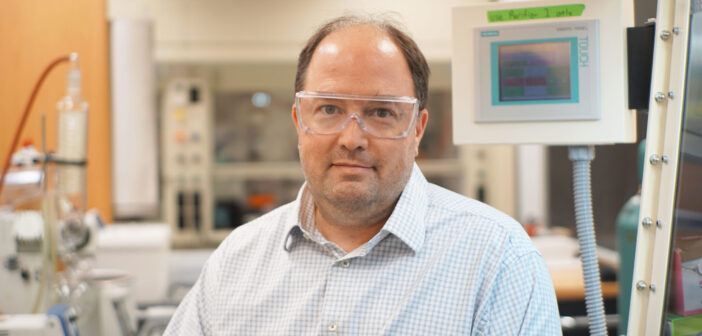Lehigh chemistry professor David Vicic won the 2025 American Chemical Society Award for Creative Work in Fluorine Chemistry this past August. His work and research involved developing a reagent to quickly install an important functional group, difluoromethyl, into drug-like molecules.
According to the American Chemical Society website, the national award is presented annually and recognizes outstanding contributions made to the advancement of the chemistry of fluorine.
Vicic said his work has also received recognition from Pfizer, who has patented a process that uses the reagent to prepare difluoromethyl-containing molecules that may be useful for the treatment of proliferative disorders, including cancer.
Vicic said roughly 50% of the pharmaceuticals on the market have fluorine in them, but there are few naturally occurring sources of fluorine — it’s usually human-made.
He said fluorine is a “hot area” because there are some environmental concerns surrounding fluorine molecules, especially if they reach a certain size or chain length.
Therefore, taking the fluorine out after the work is done is an important step, he said.
“It’s funny because I probably got this award for putting fluorine into molecules, and it almost seems like right now my trajectory is trying to take fluorine out of molecules,” Vicic said.
To build on his award-winning research, Vicic now finds himself at the forefront of a $26 million dollar initiative.
His team — including computational chemistry professor Lisa Fredin, molecular spectroscopy professor Elizabeth Young, cognitive psychology professor Jesscae Marsh and economics professor Todd Watkins — is collaborating with five other universities to develop new refrigerants, find ways to repurpose existing ones and discover battery refrigerants.
Young said one of Lehigh’s main contributions to the project will be synthesis and repurposing.
Her role within the project is focused on developing sustainable solutions to prevent more environmental damage caused by refrigerants, which are the chemicals used in air conditioning systems to cool buildings and houses.
She said this includes reusing the refrigerants and developing safer, less environmentally dangerous, alternatives instead of throwing them in the trash.
“I like working on problems that have a nice societal impact,” Young said. “This way, when the project is successful, we are going to achieve (solving) pollution and negative impacts of these refrigerants being released into the atmosphere, and instead trap them and recycle them and turn them into something else that can be used.”
Watkins said the team decided a collaboration of professors from different areas of expertise would be helpful because some program grants expect winners to produce commercial products.
“There’s a psychological component to getting people to be willing to repurpose or recycle, as well as an economic part in deciding whether the products we develop will be of interest to the industry,” Watkins said.
Vicic said the University of Kansas is leading the collaboration and focusing on the chemical engineering aspects while Lehigh is focusing on the chemistry-specific aspects of the project because of Vicic’s expertise with fluorine.
Young said having a group of universities is important because the project entails tackling large societal challenges.
Lehigh graduate students, Luc Mauro, ‘27G, and Lydia Emswiler, ‘26G, are also working on this project in the Vicic Laboratory.
Vicic said he teaches about 200 students organic chemistry, and they often join the lab outside of class.
“I think it’s fun just to teach organic chemistry, but then to take the students in and have them take their education a step further is pretty nice,” Vicic said.
Mauro said Vicic’s expertise in his field is incredible and a helpful tool for his students because they can easily ask Vicic questions and work toward solutions with him.
“The number of connections he has available to him, whether they’re in the industry or colleagues elsewhere, has enabled us to get expertise from them too,” Mauro said.
The work of the graduate students will be presented at weekly meetings with other universities to ensure progress is being made.
Vicic said students have their own council within the center, and the Lehigh graduate students will be able to join his team on-site visits to places like Hawaii, Kansas and campuses of the other participating universities.
Mauro said the team is also working with HFC refrigerants, including R-134a, one of the most abundant refrigerants in the atmosphere.
An HFC refrigerant is a hydrogen, fluorine, and carbon chemical composition.
“The HFCs do not deplete the ozone layer, but they have a very high global warming potential, meaning that one kilogram of HFC refrigerants in the atmosphere is equivalent to releasing thousands of kilograms and carbon dioxide,” Mauro said.
Vicic and his team were one of only four award recipients out of 300 applications nationwide. He said earning this recognition is a big deal, as the team’s work will get Lehigh’s name out in the field, and industry is a large part of this project.
The team will also be able to establish relationships with prestigious universities and industry leaders through the project’s site visits and weekly meetings, he said.
Emswiler said this project is a really good opportunity for Lehigh.
“We are with some really big-named schools, and I think research wise, the funding is really beneficial, and it puts Lehigh up there with all these other top-tier schools in one of the biggest grants you can get,” she said.
Vicic said he’s appreciative of all the recognition the work has received so far and he admires people who have won the award in the past, as he feels lucky to be a part of that group.






Comment policy
Comments posted to The Brown and White website are reviewed by a moderator before being approved. Incendiary speech or harassing language, including comments targeted at individuals, may be deemed unacceptable and not published. Spam and other soliciting will also be declined.
The Brown and White also reserves the right to not publish entirely anonymous comments.